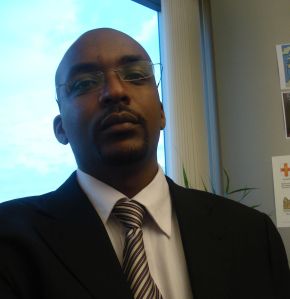 Michael Niyitegeka is the Corporate Relations Officer at Makerere University’s Faculty of Computing and Informatics Technology (CIT).In his presentation at the Digital Africa Summit; a gathering of ICT industry actors, delegates, regulators, service providers, Michael presented on the urgent need for Industry-Academia relations in the dynamic and fast changing world of IT education.
Michael Niyitegeka is the Corporate Relations Officer at Makerere University’s Faculty of Computing and Informatics Technology (CIT).In his presentation at the Digital Africa Summit; a gathering of ICT industry actors, delegates, regulators, service providers, Michael presented on the urgent need for Industry-Academia relations in the dynamic and fast changing world of IT education.He asserts that industry has to get involved in the education and creation of tomorrow’s innovative solutions all the while inspiring tomorrow’s innovators. He sat down with Asiimwe Colin to answer a few questions on his passions, the industry landscape and this ‘relationship’
Q: Tell us about why the Faculty of Computing and IT is said to be the biggest computing, research, and training facility on the continent. Was it always that big, or is it a question of a big Makerere University having a big computing faculty?
A: The Faculty of Computing and IT is regarded as the biggest computing, training institute in Africa because of the size of the facilities it hosts. With infrastructure that can accommodate up to 10,000 students, computing labs that can accommodate up to 800 students in research terms. Close to 30 PhD holders are Faculty staff and with nearly 50 PhD students we are set to have the largest continental qualified research capacity in a few short years. I also think it is about a deliberate effort to be the best and to do things differently; it’s about dedicated, focused, visionary leadership; it’s about a staff team willing to go the distance to be the best.
Q: This relationship you have advocated for across the world, what advantage does it present that the more traditional means of education and instruction don’t provide?
A: The advantages of an Industry-Academia relationship are enormous. The best and brightest universities in the world like MIT, Stanford, Harvard, Cambridge, Oxford, and University of Cape Town are leading because they have very strong industry-academia relationships. Right now universities are mostly independent of industry or, where the relationship exists it is very loose and yet we must work together to realize the synergies that exist between us. Universities are research hubs and the relevance of that research, or its novelty, inspires industry confidence to invest funds in it; creating commercial ventures. The interaction will inform teaching planning and delivery methods. The ability to teach using real world scenarios makes solution directed research easy and plausible.
Q: What do you say to some who say this method will dull the instincts of the students; in the sense that by giving all students a fair chance at the industry, you are reducing competition and therefore creating a disadvantage for the sharpest of them?
A: I do not agree with that school of thought. In fact, it makes them sharper and more responsive to the needs of society. It ignites ideas in their minds that will create the competition necessary to inevitably raise the innovation and imagination bar because the students know where the benchmarks are set, and they will try to meet that standard. This interaction is mutually beneficial because the students will have an idea of what to expect at the workplace and the industry gets better quality employees.
Q: And what are the returns for you as an instructing facility?
A: The opportunity to collaborate and develop new innovations. We will expect more involvement from the industry in the delivery of our programs, as well as the development of program materials. This is invaluable in terms of returns and as a measure of success. This relationship is a must have and there is no way we can do without it.
Q: What are your passions?
A: I am passionate about facilitating processes, going the extra mile to achieve success, doing things differently in order to be different, integrating technology into business processes and my greatest passion is enabling people to achieve through my role as a lecturer.
Q: Where do you see the ICT landscape forming into in the future for African students especially considering that they are not as advantaged as their counterparts in the west?
A: Extremely bright! We have what it takes to deliver the latest, most relevant solutions. There are so many opportunities now for young African ICT enthusiasts. The world is listening to them; all they have to do is speak up. Even more exciting is that today more than ever Uganda, and Africa, has the young people to answer these questions; the questions on e-health, e-commerce, e-learning, e-banking, e-anything. They are brilliant, passionate, they understand the problems, and all we have to do is guide them. It is my unparalleled belief that we are yet to see the best from them.
Q: Share your thoughts on excellence and performance enhancement in business processes and elements.
A: Business processes ought to be smart with limited, if at all any, redundancies. I believe performance excellence and enhancement can only be attained if the processes deliver in the shortest possible time with limited expenditure and highest return. ICT’s can enable this to happen as enablers of process, service and capacity delivery.
Q: … A final word perhaps?
A: I am extremely excited about the future of ICT. I believe as the industry continues to converge, the advantages for us as educators and also as employers, are even more limitless.
No comments:
Post a Comment